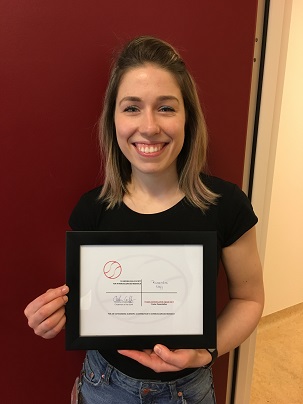
SSAR Young Investigator Award 2019: Roxandra Nagy
Origin of bile acids in follicular fluid in human ovaries
Background: Follicular fluid, the natural environment of oocyte development, is rich in cholesterol that is primarily used for the synthesis of steroid hormones. Bile acids (BA), which are important cholesterol derivatives, are also present in FF and have been linked to fertility and embryo development. However, information on the source of ovarian BA is lacking. Therefore, we aimed to study local ovarian synthesis and BA transport from blood into FF.
Methods: Total BA levels were determined in matching FF and blood samples from women who underwent in vitro fertilization. In vitro BA production by human mural (MGC) and cumulus granulosa cells (CGC) was measured by mass spectrometry. Gene expression and protein production were quantified in human MGC and CGC and in human ovarian tissue by quantitative PCR and Western blot /immunohistochemistry, respectively.
Results: There was a significant correlation between the levels of BA in blood and FF (rs=0.186, P=0.027). However, levels of FF BA were almost double those in blood (10.10 [8.38-11.93] μmol/l versus 5.89 [4.15-7.88] μmol/l, P<0.001), indicating that, in addition to passive diffusion, other origins of ovarian BA likely exist. The key BA enzymes CYP7A1 and Cyp8B1 were absent or barely detectable in MGC and CGC, and there was no evidence of BA production in vitro in isolated GC. Therefore, local ovarian BA production is highly unlikely. However, we identified for the first time substantial expression of the common BA importers (NTCP, ASBT) as well as a BA exporter (MRP3) in GC of human ovaries.
Conclusion: These results indicate that passive and active transport of BA from blood into FF constitute the main sources of ovarian BA.
More news
-
15 September 2025
Successful visit to the UG by Rector of Institut Teknologi Bandung

